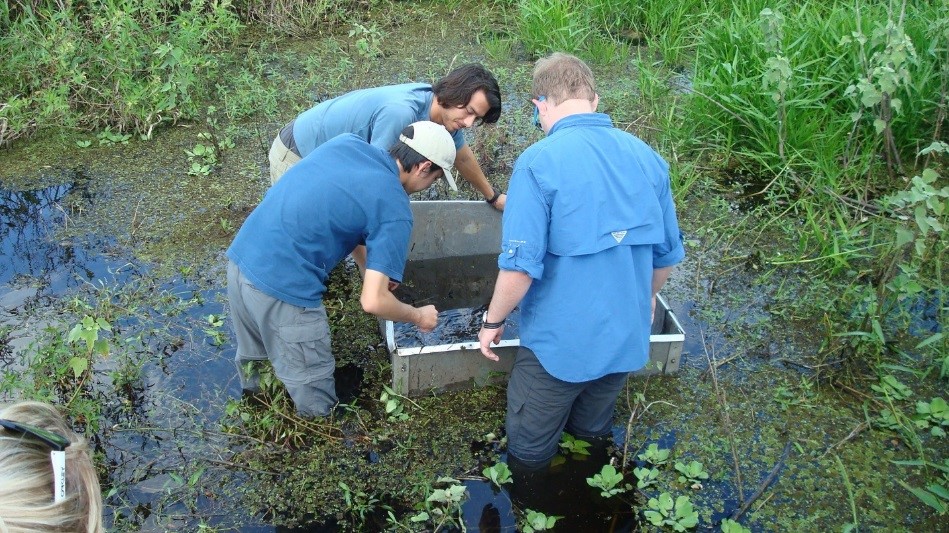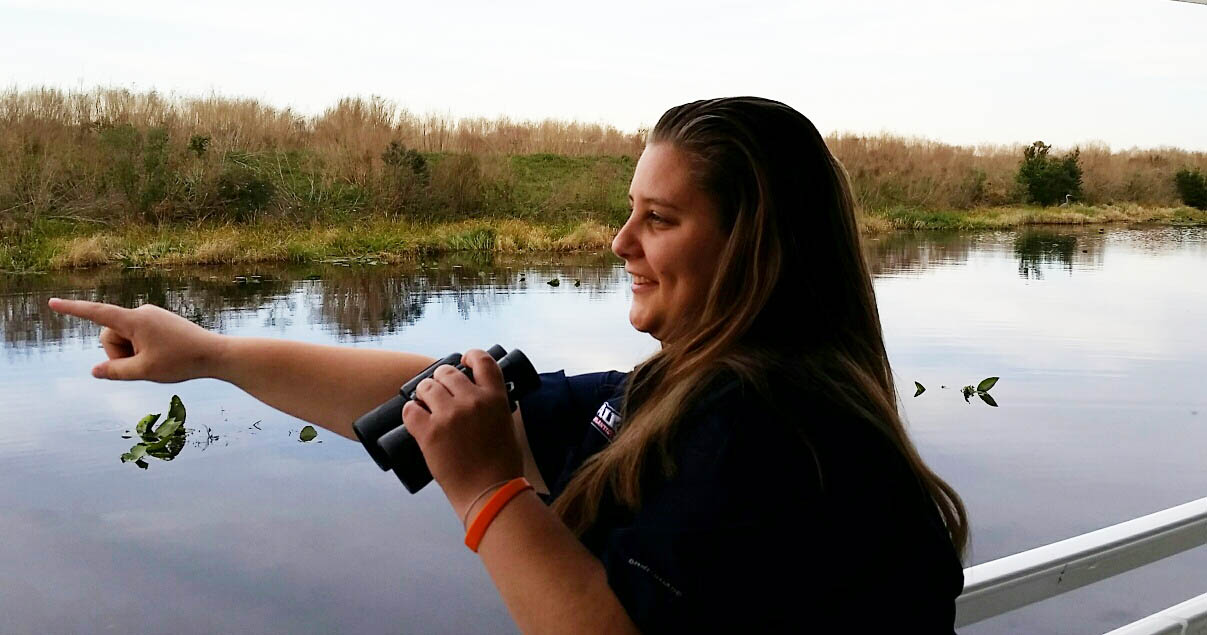
Undergraduate students in the “Critical Thinking in Environmental Science” class taught by Dr. Diane Owen learn how to conduct Throw Trap studies and collect data on the Kissimmee River at Riverwoods.
CES scientists work with university students that are interested in conducting research on a component of the Kissimmee River Restoration Project. Riverwoods’ Director acts as field advisor for the students’ project and provides field and logistic support. The student needs to have a faculty advisor to formalize the project at FAU or their home university. CES works with the SFWMD scientist to provide data and oversight of the student research. The types of student research that we support are:
 Jennifer Swain is a FAU senior pursuing a Bachelor of Science degree in Biology with a focus on environmental science and fisheries. Jenny has been working part-time as CES’ Education Assistant since May 2014. She has proven to be a very motivated and talented member of the Riverwoods team! Jenny has many office responsibilities, but working as interpretive guide for Student Field Studies Exploring the Kissimmee River via pontoon boat is her most important task. She leads student classes teaching them about the past, present, and future of the Kissimmee River and restoration. She guides students in testing water quality, conducting diversity and abundance bird surveys, and identifying wetland plants, invertebrate, and her favorite, fish. She serves as US Coast Guard first mate, so she is required to participate in the drug free vessel/random drug testing program. Jenny completed months of training on the boat and even practiced at home to prepare to lead the Student Field Studies Program – and she does a great job!! Jenny says that “my favorite students are FFA / 4H and agricultural classes. I have an agriculture background and held offices in Future Farmers of America (FFA), so I really enjoy sharing the success of the Kissimmee River Restoration with these students!”
Jennifer Swain is a FAU senior pursuing a Bachelor of Science degree in Biology with a focus on environmental science and fisheries. Jenny has been working part-time as CES’ Education Assistant since May 2014. She has proven to be a very motivated and talented member of the Riverwoods team! Jenny has many office responsibilities, but working as interpretive guide for Student Field Studies Exploring the Kissimmee River via pontoon boat is her most important task. She leads student classes teaching them about the past, present, and future of the Kissimmee River and restoration. She guides students in testing water quality, conducting diversity and abundance bird surveys, and identifying wetland plants, invertebrate, and her favorite, fish. She serves as US Coast Guard first mate, so she is required to participate in the drug free vessel/random drug testing program. Jenny completed months of training on the boat and even practiced at home to prepare to lead the Student Field Studies Program – and she does a great job!! Jenny says that “my favorite students are FFA / 4H and agricultural classes. I have an agriculture background and held offices in Future Farmers of America (FFA), so I really enjoy sharing the success of the Kissimmee River Restoration with these students!”
Riverwoods’ Director met Jenny when she was a guest at Riverwoods and volunteering for Highlands Lakes Volunteer program that is managed by Florida Fish and Wildlife Conservation Commission (FWC). Highlands Lakes volunteers help protect Florida lakes, wetlands and fisheries. Jenny took a real interest in the Kissimmee River Restoration, especially when she learned that fishing has rebounded since the restoration! Jenny loves fish – and has lots of experience in fishing and aquaculture. So it is no surprise, when asked what is her favorite research project that Jenny states, “learning more detail about the fish communities in the Kissimmee River has been, by far, my favorite project! I have gained knowledge, skills, abilities, and contacts with a multitude of different state, government, and county scientists.”
When asked to describe her research project that she conducted with CES for school credit. Jenny states that “My DIS project goal was to provide a snapshot of the diversity and abundance of native and non-native fishes in the restored Kissimmee River. I conducted the DIS with Dr. Paul Wills at Harbor Branch, and Loisa Kerwin, my CES supervisor, was my field advisor. The objective of this study was to collect data to help determine the relative abundance of native fish and non-native fish in the restored and channelized Kissimmee River. The data collection methods that were used are Creel Surveys (three boat ramp locations) and standardized Electrofishing. She was very fortunate to assist the South Florida Water Management District’s Kissimmee scientists with their Electrofishing project conducted at random sites of restored and un-restored river. She worked with their data to compile her DIS research project.
Jenny discusses her research results, “Results from the Creel Surveys documented 113 fish caught with Bluegill and Sailfin Catfish that were the most sought after species. Results from the Electrofishing: documented 1,424 fishes representing 27 species with the native Bluegill the dominant species. My results are consistent with expectations for native and game fishes in the restored Kissimmee River.”
| Common Name | Scientific Name |
| Black Crappie | Pomoxis nigromaculatus |
| Bluegill | Lepomis macrochirus |
| Brown Bullhead | Ameiurus nebulosus |
| Chain Pickerel | Esox niger |
| Channel Catfish | Ictalurus punctatus |
| Florida Gar | Lepisosteus platyrhincus |
| Largemouth Bass | Micropterus salmoides |
| Redbreast Sunfish | Lepomis auritus |
| Redear Sunfish | Lepomis microlophus |
| Spotted Sunfish | Lepomis punctatus |
| Warmouth | Lepomis gulosus |
| White Catfish | Ameiurus catus |
| Blue Tilapia (NON-NATIVE) | Oreochromis aureus |
| Brown Hoplo (NON-NATIVE) | Hoplosternum littorale |
| Mayan Cichlid (NON-NATIVE) | Cichlasoma urophthalmus |
| Sailfin Catfish (NON-NATIVE) | Pterygoplichthys multiradiatus |
| Walking Catfish (NON-NATIVE) | Clarias batrachus |
When asked about Jenny’s most challenging project, she states “Learning enough about the Kissimmee River Restoration Project so that I could teach it to others. Everyone that I work with has been here since the beginning, so I have plenty of people to ask questions, which helps expand my knowledge. Being from the younger generation, it is challenging to learn more about this project than the average adult. Every day there is something new and exciting happening on the river! It is always changing, so you have to be sure to keep up with it and explain the changes.”
Jenny’s advice to students interested in pursuing an internship in environmental science or education, “We are the future, so we must educate others about caring and saving our environment. We need to get involved! You can reach out to middle school or high school students. You can never learn enough about the field you’re interested in. Try to find an internship to gain valuable experiences. Try to be passionate about what you are doing! Take every opportunity available and run with it; it will open many doors!”
Interested in discussing student research opportunities?
Please send an email to Amber Moore, Riverwoods Manager at ambermoore@fau.edu